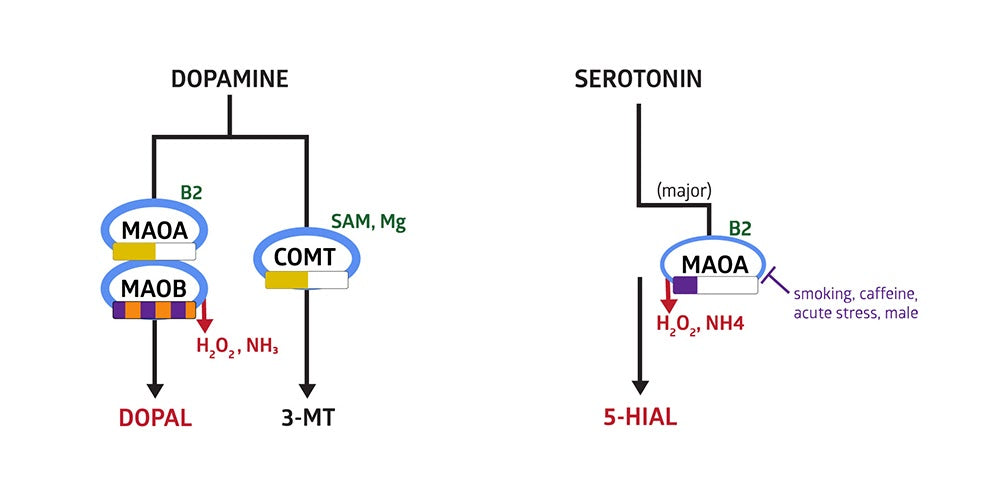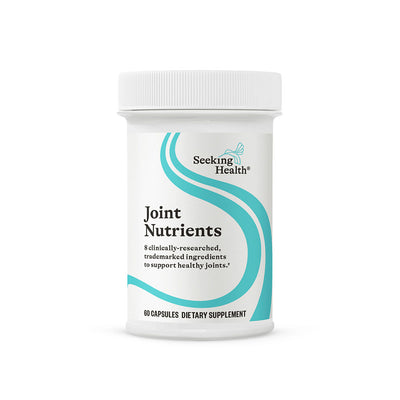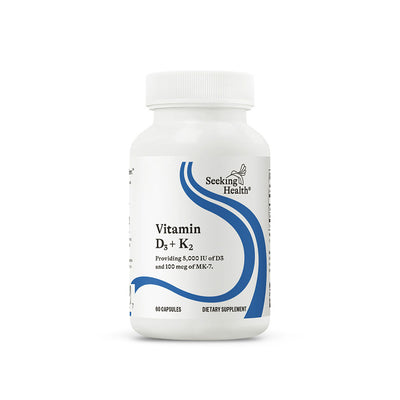Do you get at least seven hours of sleep per night? Consistently? The National Sleep Foundation and American Academy of Sleep Medicine agree that's how much you need. Seven hours of sleep per night supports optimal health and wellbeing. (1)
Sleep is a foundational part of cleaning your genes. Dr. Ben Lynch’s protocol for this is found in his book Dirty Genes. Before you consider pharmaceutical or supplement interventions, look at the basics first. Sleep is a crucial place to start.
How Much Sleep Do You Need?
More than one-third of Americans are getting less than seven hours of sleep per night, says the CDC. (2) A study from 2012 found that nearly one-third of adults get less than six hours of sleep each night. (3)
You know that a poor night of sleep can make the next day worse. It might make you forget an important meeting or spill coffee on your (new) white blouse. It will also probably make you grumpy. You’re not imagining it, either. Moderate sleep deprivation is like having a blood-alcohol concentration (BAC) of .05 percent. (4) In California, you are legally impaired if your BAC reaches .08. (5)
If you go to work on little sleep, it’s like stopping at the bar beforehand for a drink or two. Your boss probably wouldn’t sign off on that idea.
If you’re thinking, “I get six hours of sleep every night. One more hour won’t make that much difference,”... think again. Research on Daylight Saving Time shows that even one hour of lost sleep can cause trouble. Some states in the U.S. “lose” an hour of their day by springing their clocks forward in March. The result? Increases in heart disease, more car crashes, and even workplace injuries. (6)
Not convinced that minor sleep loss can decrease awareness or lead to health problems? Watch this TEDTalk.
Sleep Quality vs. Quantity
It’s not always the length of sleep that is a concern. The time that it takes you to fall asleep matters, too.
Going to bed late and sleeping in has a worse effect on weight and health than early to bed, early to rise. (7) Your circadian rhythm, also known as the sleep-wake cycle, relies on consistency. (8)
You need both a regular bedtime and a consistent duration of sleep.
Some people have a hard time getting to sleep. Others have a hard time staying asleep. Some even struggle with both. Getting enough high-quality sleep can feel impossible if you have these challenges.
If you are desperate to sleep better, we get it. But, unfortunately, relying on over-the-counter sleeping pills is not a sustainable way to get a good night's rest. (Always consult your healthcare provider for medical advice for sleep disorders. Do not stop sleep medication without their advice.)
There is a way to get better quality sleep. Whether you’re stuck in a pattern of staying up too late, or you can’t stay asleep through the night, you're not alone.
There are four causes of sleep problems that lead to most issues. Learn which ones affect you so that you can go beyond short-term solutions and get optimal rest.
4 Causes of Your Sleep Problems
There are many reasons why someone might not be able to sleep well.
Genetic issues, nutritional deficiencies, and hormones are all common triggers. Looking at each of these factors can rule out apparent causes. Luckily, you can control many of them and rewrite your body's ability to sleep.
It all starts with your genes.
1. Your Sleep Genes
As Maria would say in The Sound of Music, let’s start at the very beginning.
You may have been born with a higher susceptibility to poor sleep. Or a good night’s rest might literally be in your genes.
Dr. Ben Lynch is a naturopathic doctor and the founder of Seeking Health. His primary focus is the study of epigenetics and biochemistry. His research has led him to two genes that play prominent roles in mood, emotional behavior, and sleep. These genes are Monoamine Oxidase A (MAOA) and Catechol-O-methyltransferase (COMT).
MAOA and COMT are found within your dopamine and serotonin pathways in the body. These pathways are where these neurotransmitters are created and broken down. These two genes produce enzymes that break down certain brain chemicals involved in emotional and mental behavior.
Two genes that play important roles in sleep are MAOA and COMT.
Catechol-O-methyltransferase (COMT): This enzyme breaks down dopamine. It also breaks down other catecholamines such as estrogen.
Monoamine Oxidase A (MAOA): This enzyme breaks down dopamine and serotonin.

Some neurotransmitters, such as dopamine, are excitatory. They can make you feel alive, awake, and alert. When dopamine is present in too high amounts, it may be hard for you to calm down.
Other neurotransmitters, such as serotonin, are responsible for feelings of joy. Serotonin can be quite calming and eventually turns into melatonin, your sleep hormone.
But too much of a good thing can still be bad. For example, if serotonin gets too high, it can trigger irritation, agitation, and nervousness.
The brain chemicals that make you happy can also make you irritated.
Your brain demands balance in these neurotransmitters. Too much is bad, but too little can be worse.
If these brain chemicals get too low, they can lead to negative moods and behavior. They can trigger nervousness, poor emotional balance, and yes—poor sleep.
For example, we know that serotonin helps create melatonin, the sleep hormone. Without enough serotonin, you can also lose sleep.
When it comes to sleep (and life in general), you want a healthy balance of all your neurotransmitters. This will help you be calm, relaxed, tranquil, and clear-minded.
Both the MAOA and COMT genes can have genetic mutations that lead to dysfunction in the enzymes they make.
Fast MAOA and COMT
If your mutation leads to a faster enzyme speed, you may be burning through your neurotransmitters too fast. This would leave you without adequate levels, requiring frequent replenishing. If you're not able to make enough serotonin to produce melatonin, you won’t be able to sleep through the night. In this case, ensuring you are supporting serotonin production is essential.
Slow MAOA and COMT
If your genetic mutation leads to a slower enzyme speed, you may have a backlog of neurotransmitters. This is because they are not broken down at a normal pace. In this case, you may not be able to unwind at night. You may feel wired or struggle to get to sleep. If this is you, it’s essential to support your metabolism of dopamine and serotonin.
Many genes can have mutations that speed up or slow down the enzymes they make. MAOA and COMT are two that tend to be either too fast or too slow.
![[Infographic]-Fast-vs-Slow-MAOA-COMT](https://cdn.shopify.com/s/files/1/0010/0250/4310/files/Infographic-Fast-vs-Slow-MAOA-COMT.jpg)
Want to know whether you have a fast or slow MAOA and COMT? Check out the StrateGene DNA test. It gives you key insights into your unique biochemical pathways based upon your genetics.
You can also take the quiz from Dirty Genes. It asks questions to help you determine whether you have the typical signs of a fast or slow MAOA or COMT.
If you find that your levels are too high (slow MAOA/COMT), you will want to nutritionally support their breakdown.
If your levels are too low (faster COMT/MAOA), you will want to nutritionally support the production of these neurotransmitters.
Do you have a fast COMT but a slow MAOA? Or vice versa? This means you may be breaking down some neurotransmitters faster and others slower. Because both of these enzymes break down some of the same compounds, this combination may lead to a good balance in some areas. But these enzymes could change speed based upon what they are metabolizing.
Want to know what's happening in your brain? Take the Dirty Genes quiz. It will help you figure out which neurotransmitters are building up and which ones are being metabolized too fast.
2. Neurotransmitter Byproducts
Besides MAOA and COMT, there are other ways that your dopamine and serotonin pathways can malfunction and lead to poor Zzzs. Byproducts created from serotonin or dopamine metabolism can also disrupt sleep.
When any compound breaks down in the body, it results in byproducts. Some of these can be toxic. Some can be excitatory, too. This is why they need broken down and removed from the body.
These potentially toxic byproducts include:
- DOPEGAL: A byproduct of norepinephrine and epinephrine breakdown
- DOPAL: A byproduct of dopamine breakdown
- 5-HIAL: A byproduct of serotonin breakdown
- Ammonia: A byproduct of serotonin, dopamine, norepinephrine, and metanephrine breakdown via the MAOA and MAOB enzymes. Ammonia is also a byproduct of melatonin breakdown.
These byproducts with toxic potential are shown in red in the pathway below from the StrateGene DNA Report.

High levels of these byproducts can make you feel agitated and irritated. This is because they have an oxidizing and damaging effect.
Some sleep issues have nutrient deficiencies at their root. Or they can be related to a buildup of toxic compounds, which can increase excitatory glutamate levels in your brain.
There are other enzymes, in addition to MAOA and COMT, in the dopamine and serotonin pathways that help to break down byproducts.
As you can see in the pathway above, the ALDH1B and ALDH2 enzymes are needed to break down 5-HIAL, DOPEGAL, and DOPAL. You can also see that MAOA creates a byproduct, ammonia, which can be damaging to cells in high amounts.
If you burn through your neurotransmitters quickly, you will want nutritional support for your body to break down and reduce these byproducts.
Nutrients that support metabolism of toxic byproducts:†
- Zinc: Supports the normal breakdown of potentially toxic DOPEGAL as a cofactor for the ADHB1 enzyme.
- Thiamine (B1): Helps break down the potentially toxic 5-HIAL, DOPEGAL, and DOPAL as cofactors for the ALDH2 enzyme.
- Ornithine: Supports normal ammonia breakdown. Ammonia can lead to excitation in the brain.
3. High Glutamate
Glutamate is another neurotransmitter that is vital for memory and learning. It is created in the brain from the amino acid L-glutamine. It is the most abundant neurotransmitter in the nervous system.
High levels of glutamate can feel like racing thoughts, rumination, excessive worrying, and nervousness. If you feel this way, you know how impossible it is to just lay down and go to sleep.
When glutamate is too high, such as during chronic stress or in nutrient deficiencies, it’s more damaging than helpful. High glutamate in your brain can lead to excitation and prevent you from calming down at the end of the day.
Having a regular bedtime, where you fall asleep in a reasonable timeframe, is important for your health. It also influences your quality of sleep. If you can’t calm down because of high glutamate, your sleep is sabotaged, too.
Balancing Glutamate Levels
Glutamate releases during times of importance or stress. It helps the brain to learn or remember something. When glutamate is too high, it can lead to cell death, damage, and feelings of nervousness. This happens because it activates the NMDA receptor, allowing calcium to be pulled into the cell. This increases excitation.
Because magnesium regulates the influx of calcium into cells, magnesium deficiencies can increase excitation in cells even more.

(Image adapted from here)
Healthy glutamate regulation requires an enzyme known as Glutamate Decarboxylase (GAD). GAD is responsible for taking glutamate and turning it into the calming, inhibitory neurotransmitter, Gamma-aminobutyric acid (GABA).
You need normal amounts of GABA and glutamate for a positive, calm mood.
Low levels of GABA are associated with mood issues like nervousness and tension.
A GAD enzyme that isn’t balanced can disrupt both GABA and glutamate. This can happen if you don’t have enough cofactors to support GAD. Vitamin B6 is an important one. (9)

Studies show that supplementing with vitamin B6 can increase the activity of the GAD enzyme and GABA production. (9) Making sure you have enough vitamin B6 can support healthy feelings of calm.†
There are other nutrients that support the downregulation of the NMDA receptor (glutamate receptor), to promote healthy glutamate inhibition.†

Magnesium and vitamin B6 are both necessary to regulate glutamate levels. Deficiencies in either can result in an imbalance with this neurotransmitter.
Lithium is not an essential mineral, but in tiny microgram amounts, it may be crucial for supporting your healthy sleep. This is especially true if you tend to struggle calming down at the end of the day.†
If you rely on a glass of wine (or two!) or sleep medicines to unwind enough for sleep, there are nutritional ways to support a calm mind that may be healthier for you.
Nutrients that support glutamate metabolism†:
- Magnesium: Supports healthy regulation of glutamate by preventing calcium influx into the cell.
- Vitamin B6: Supports healthy glutamate conversion to GABA, a calming neurotransmitter.
- Lithium: Supports healthy GABA production and glutamate inhibition.
4. Cortisol

You know that managing stress is important. That doesn't mean you always know how to find stress relief.
Cortisol is your stress hormone. It releases, like many brain chemicals and hormones, during times of chaos and tension. The balance of cortisol and other neurotransmitters and hormones gets disrupted when stress becomes chronic. The interplay between all these signaling compounds and the tissues that create them is your endocrine system.
Your endocrine system is your adrenal glands, reproductive organs, thyroid, and pituitary gland. When this system is out of balance, it affects your mood, stress, and emotional regulation in negative ways. This makes it hard to calm down and be positive. It also makes falling asleep and staying asleep a … nightmare (pun intended?).
Supporting Balanced Cortisol
Cortisol may be supported through certain herbal supplements and plant compounds. These are known as adaptogens. They literally help the body adapt to the environment.
Adaptogens work by providing balance. They may increase or decrease cortisol levels as needed. This is much like the thermostat that regulates the internal environment of your home to maintain a steady temperature.
Phosphatidylserine is another powerful plant-based compound. It is incredible for supporting healthy cortisol levels and nervous system response. This phospholipid is best derived from sunflower, not soy, which can be inflammatory for some people.†
Nutrients for healthy cortisol response†:
- Ashwagandha: An adaptogenic herb that supports a healthy mood and relaxation.
- Phosphatidylserine: A phospholipid that supports healthy feelings of calm and normal nervous system responses.
Though there are many other ways to improve your sleep quality, nutritional support is a great place to start. Dietary supplements can help you obtain these nutrients fast and efficiently, so you can start sleeping better tonight!†
Natural Support with Sleep Supplements†
Dr. Ben Lynch, founder and master formulator here at Seeking Health, has designed a top-selling sleep supplement .†
Though some may reach for melatonin supplements first, that is not always the best choice. Melatonin is a hormone and can become habit-forming for some people. It may also cause uncomfortable side effects like morning drowsiness, foggy-headedness, or even feelings of jet lag.
Optimal Sleep II†: Support to fall asleep†

What is it? Seeking Health’s Optimal Sleep II† formula supports the healthy onset of sleep for those occasional sleepless nights.†
Who it’s for: If you have trouble unwinding or spend too much time counting sheep.
What does it include? Nutrients that support the healthy onset of sleep and feelings of calm:†
- Lithium, Vitamin B6, & Magnesium — These nutrients support glutamate metabolism and feelings of calm. Magnesium is also a cofactor for the COMT enzyme to support the normal breakdown of dopamine, epinephrine, and norepinephrine.†
- Riboflavin — This B vitamin is a cofactor for the MAOA enzyme. It helps to metabolize dopamine for feelings of calm.†
- Zinc, Niacin, & Thiamin — These nutrients are cofactors for the ADH1B and ALDH enzymes. They support the normal breakdown of potentially toxic and excitatory compounds 5-HIAL, DOPEGAL, and DOPAL.†
- Ornithine — This amino acid helps to support normal ammonia breakdown caused by neurotransmitter metabolism. Ammonia can lead to excitation in the brain.†
- Ashwagandha — This herb has been used in Ayurvedic medicine for centuries to support healthy mood and cortisol regulation. It is an adaptogen and supports feelings of calm.†
- Phosphatidylserine — This sunflower-based phospholipid has been shown to support healthy cortisol regulation for feelings of calm and relaxation.†
Key Benefits of Optimal Sleep II†:
- Supports healthy onset of sleep for occasional sleeplessness
- Promotes healthy metabolism of dopamine, epinephrine, and norepinephrine for feelings of calm and relaxation
- Great for those with slow MAOA or COMT enzymes
The Bottom Line
Sleep-promoting habits can make a big difference in your wellness.
Getting uninterrupted sleep is essential for your health. To get the best sleep possible, you need to have a regular bedtime and sleep for at least seven hours per night. Research is clear: the less sleep you get, the greater your chance of unfavorable outcomes (including disease and even death!).
There are so many reasons why you might not be able to get restful sleep. The good news is that you can take some control over your sleep problems. Whether you address genetic mutations or get nutritional support, you can be empowered to get the rest you desire.
Dr. Ben Lynch designed Seeking Health’s Optimal Sleep II† to support the healthy onset of sleep for those occasional sleepless nights.†
Ask your healthcare provider if Optimal Sleep II† might be the perfect partner for your bedtime routine!
References
- https://www.ncbi.nlm.nih.gov/pmc/articles/PMC6267703/
- https://www.cdc.gov/mmwr/volumes/65/wr/mm6506a1.htm?s_cid=mm6506a1_w
- https://academic.oup.com/sleep/article/38/5/829/2417009
- https://www.ncbi.nlm.nih.gov/pmc/articles/PMC1739867/
- https://alcohol.stanford.edu/alcohol-drug-info/buzz-buzz/what-bac
- https://openheart.bmj.com/content/1/1/e000019
- https://www.ncbi.nlm.nih.gov/pmc/articles/PMC3174832/
- https://www.ncbi.nlm.nih.gov/pmc/articles/PMC6773696/
- https://www.ncbi.nlm.nih.gov/pmc/articles/PMC4954698/












